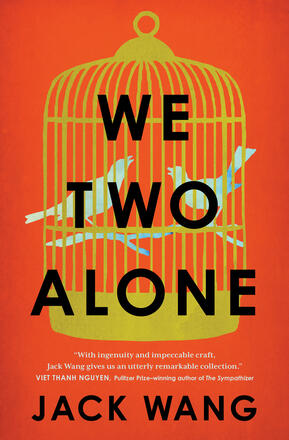
We Two Alone
La description
A masterful collection of stories that dramatizes the Chinese diaspora across the globe over the past hundred years, We Two Alone is Jack Wang’s astonishing debut work of fiction, perfect for fans of Viet Thanh Nguyen’s The Refugees.
Jack Wang was shortlisted for the 2014 Commonwealth Short Story Prize, whose jury included Booker Prize-winner Marlon James. Wang is currently working on his debut novel, forthcoming from Anansi.
Récompenses
- Long-listed, CBC Canada Reads
- Winner, Danuta Gleed Literary Award
Reviews
Rich and poignant … History lovers and literary buffs will sink joyfully into his moving collection … Wang manages to underscore the importance of cultural heritage while stressing humanity’s common ties … His ability to create vivid and believable settings, in beautiful and readable prose, will deeply move readers.
- Winnipeg Free Press
Jack Wang’s extraordinary debut book of stories, We Two Alone, weaves a path across the world, following the Chinese diaspora over nearly a hundred years. It’s the kind of collection that comes along only once in a while, to be savoured by readers for its sharp, smart portraits of longing, connection, and identity.
- Open Book
In We Two Alone, Jack Wang has written an instantly engaging and achingly poignant collection of stories about people struggling to preserve their way of life and seeking stability, connection, and meaning. Focusing on Chinese immigrant experiences, Wang’s stories range freely and easily across many decades and a dizzyingly assortment of geographies. All of Wang’s characters are vividly rendered, their struggles and agonies richly conceived and indelibly portrayed. The writing throughout is atmospheric, highly visual, and peppered with startling and persuasive detail. Long after finishing it, We Two Alone lingers in the mind as a compassionate work by a profoundly talented writer who cares deeply about what it means to be human in turbulent times.
- Danuta Gleed Literary Award Jury Citation
A collection that announces an important new voice in contemporary fiction … Beyond Vancouver, Shanghai, Vienna, Port Elizabeth, and London, the stories in We Two Alone encompass Tallahassee, Los Angeles, and Boston. Wang is committed to rendering his backdrops accurately; with perfectly presented details, he showcases the disharmony of the Chinese diaspora, as individuals endure salient moments in twentieth-century history and more recent times … We Two Alone shows that Jack Wang is a master of the short story, a writer who has mapped his own space, neither Canadian nor American, nor anywhere else. Each episode in this collection is a moving tribute to its characters as well as an indictment of the ostracism that remains when racist taunts and human failures continue to bedevil the modern world.
- Literary Review of Canada
Jack Wang is a welcome new voice in Canadian letters … [We Two Alone] is serious, engaging, well crafted, thought-provoking. Wang clearly has something to say, and this accomplished collection not only says it but also promises a great deal more to come.
- Ormsby Review